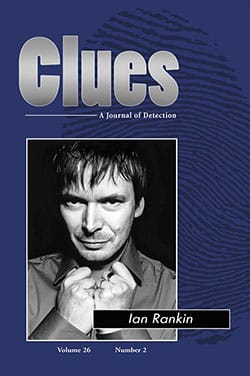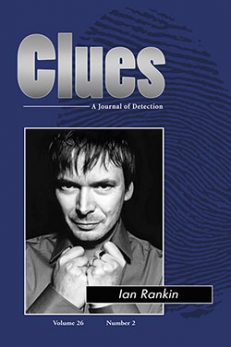Clues: A Journal of Detection, Vol. 26, No. 2 (Summer 2008)
Print Back Issue$30.00
In stock
About the Book
BACK ISSUE
This is a single back issue only. To order a current subscription, or for more information, please visit the journal’s web page at CluesJournal.com. Back issues from earlier volumes of Clues are available for order subject to availability. Also, single issues of the current volume may be ordered one at a time. Individuals may order back issues directly from our online catalog, and the charge for individuals is $30 (excluding postage). Issues from Volume 33 to the present are also available in ebook format on Kindle, Nook and Google Play.
The charge for single issues for institutions is $75 per issue (excluding postage). If your institution requires a back issue, please contact us to order at the appropriate rate.
About the Author(s)
Bibliographic Details
Executive Editor Margaret Kinsman
Managing Editor Elizabeth Foxwell
Format: softcover (6 x 9), back issue
Pages: 106
Bibliographic Info:
Copyright Date: 2008
ISSN 0742-4248
Imprint: McFarland
Table of Contents
Theme Issue: Scottish Crime Fiction
Guest Editor: Gill Plain
Editors’ Comments 3
Introduction 5
Gill Plain
Murder and the Supernatural: Crime in the Fiction of Scott, Hogg, and Stevenson 10
Christopher MacLachlan
The author traces the development of crime fiction in the work of Sir Walter Scott, James Hogg, and Robert Louis Stevenson, arguing that Scott shows murder as embedded in culture and disruptive of community but contains the disruption within an Enlightened rationality, whereas Hogg explores its impact on the community, the individual, and nature. Stevenson also shows the traumatic effect of crime, but his focus on the individual turns Hogg’s supernatural into the psychological.
Dick Donovan, the Glasgow Detective, and His Creator, James Edward (Joyce Emerson Preston) Muddock 23
Bruce Durie
J. E. Preston Muddock’s “Glasgow Detective,” Dick Donovan, was the true progenitor of the protagonist-narrator genre of serial detective fiction, hugely popular before Arthur Conan Doyle and Sherlock Holmes eclipsed him. Extant biographies of Muddock are wrong or misleading in almost every regard, largely thanks to his own inventions and obfuscations.
“The darkness at the heart of the Enlightenment”: Edinburgh in Paul Johnston’s Fiction 39
Aaron Kelly
The author assesses Paul Johnston’s fiction with regard to the contested formal politics of crime fiction, its reactionary or radical uses. He reads Johnston’s work through the lenses of Benjamin and Jameson, and also pays attention to how Johnston’s work intersects with Edinburgh writing and Scottish crime fiction.
Ian Rankin and the Ethics of Crime Fiction
Eleanor Bell 53
Writer Ian Rankin has suggested that crime fiction should invoke a self-conscious interrogation of the dark underside of society, that readers should subsequently be drawn toward an ethical engagement with the world around them. The author considers the implications of this ethical potential with reference to Rankin’s depictions of post-devolution Scotland.
“A Duty to Care”: Denise Mina’s Garnethill Series
Robert P. Winston 64
Social institutions like the medical professions and the police should protect women, but Denise Mina’s Garnethill trilogy demonstrates how such structures actually victimize them. Mina uses private investigations by Maureen O’Donnell to explore more widely applicable strategies of resistance to violence in both the home and society at large.
Denise Mina, Ian Rankin, Paul Johnston, and the Architectural Crime Novel
Peter Clandfield 79
Denise Mina, Ian Rankin, and Paul Johnston treat Scotland’s dysfunctional housing schemes and other flawed urban developments not only as apt settings for crime-based narratives but also as forms of crime in themselves. These authors redevelop the crime novel to critique grandiose architectural and political plans for Scotland’s future.
Reviews
Jenny Bourne Taylor, ed. The Cambridge Companion to Wilkie Collins. Janice M. Allan 93
Jean Gould O’Connell. Chester Gould: A Daughter’s Biography of the Creator of Dick Tracy; and Chester Gould. The Complete Chester Gould’s Dick Tracy. M. Thomas Inge 94
David Boyd and R. Barton Palmer, eds. After Hitchcock: Influence, Imitation, and Intertextuality. Ricardo Domizio 96
Lisa Matthews, dir. In Search of Bony. Lucy Sussex 97
Andrew Fleming, dir. Nancy Drew. Marty S. Knepper 99
Book Reviews & Awards
- “Clues is a must-have for readers and writers of crime fiction. Scholarly, thought-provoking, wide-ranging in its topics, Clues covers the crime and thriller map.”—Sara Paretsky
- “A. Conan Doyle, notoriously resentful of Sherlock Holmes’s success, liked to scorn ‘police romances’ as less significant and worthy of his talents than his other literary work. If he could have read Clues, the thinking mystery reader’s journal, he would surely have felt differently—and learned much he never realized himself about even his own landmark contribution to the genre, from which so much else by others has flowed.”—Jon Lellenberg, U.S. agent for the Arthur Conan Doyle estate
- “I love reading Clues. Every issue provides thought-provoking, well-researched articles. The variety and scope of the material found in Clues makes an unparalleled, ongoing contribution to our understanding of the role of crime fiction in our culture, and the genre’s reflection of its time and society.”—Jan Burke, Edgar-winning author of The Messenger (2009)
- “Clues is an important journal. It carries the torch of tradition that is the backbone of detective fiction. It goes below the surface and gets to the heart of what makes the genre so fascinating and valid today”—Michael Connelly, author of the Harry Bosch novels, including The Overlook (2007)
- “For erudite and fascinating truths about mysteries, follow the clues to Clues, the scholarly journal that is an essential resource for every serious student of the mystery”—Carolyn Hart, author of Death Walked In (2008)
- “With scholarship ranging from Poe to Peters, nothing beats Clues”—Joan Hess, author of Mummy Dearest (2008)





